九年级英语每课时精讲精练系列专题5.2 Period 2 Section A 3a-4c (人教版)
九年级英语每课时精讲精练系列专题8-2Period2SectionA3a-4c(人教版)
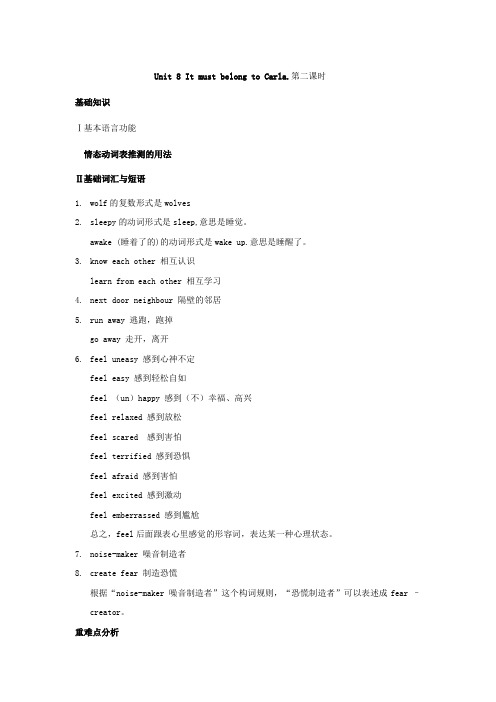
Unit 8 It must belong to Carla.第二课时基础知识Ⅰ基本语言功能情态动词表推测的用法Ⅱ基础词汇与短语1.wolf的复数形式是wolves2.sleepy的动词形式是sleep,意思是睡觉。
awake (睡着了的)的动词形式是wake up.意思是睡醒了。
3.know each other 相互认识learn from each other 相互学习4.next door neighbour 隔壁的邻居5.run away 逃跑,跑掉go away 走开,离开6.feel uneasy 感到心神不定feel easy 感到轻松自如feel (un)happy 感到(不)幸福、高兴feel relaxed 感到放松feel scared 感到害怕feel terrified 感到恐惧feel afraid 感到害怕feel excited 感到激动feel emberrassed 感到尴尬总之,feel后面跟表心里感觉的形容词,表达某一种心理状态。
7.noise-maker 噪音制造者8.create fear 制造恐慌根据“noise-maker 噪音制造者”这个构词规则,“恐慌制造者”可以表述成fear –creator。
重难点分析1. sound,noise和voice都表示“声音”,但细分起来,内涵不相同2. I think it must be teenagers having fun.我认为这一定是小孩子们在玩闹。
One woman in the area saw something running away.当地的一个妇女看到一个东西跑远了。
There must be something visiting the homes in our neighbourhood.一定是有个什么东西在光顾我们街区。
The noise–maker is having too much fun creating fear in the neighbourhood. 那个噪音制造者玩的正高兴着呢。
九年级英语每课时精讲精练系列专题2-1Period1SectionA1a-2d(人教版)
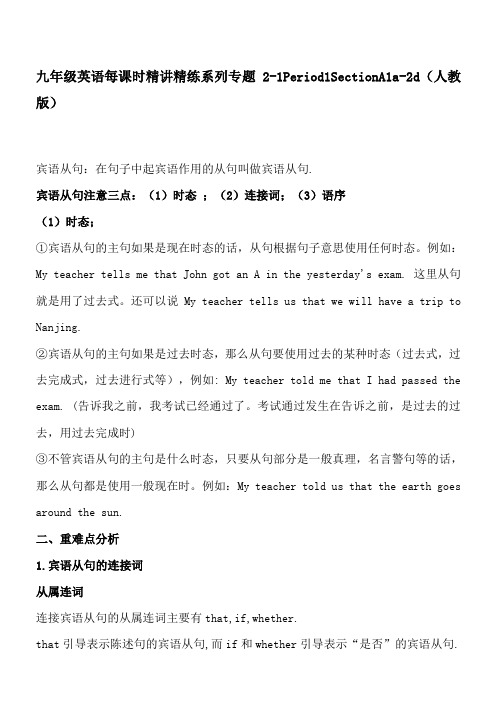
九年级英语每课时精讲精练系列专题2-1Period1SectionA1a-2d(人教版)宾语从句:在句子中起宾语作用的从句叫做宾语从句.宾语从句注意三点:(1)时态;(2)连接词;(3)语序(1)时态;①宾语从句的主句如果是现在时态的话,从句根据句子意思使用任何时态。
例如:My teacher tells me that John got an A in the yesterday's exam. 这里从句就是用了过去式。
还可以说 My teacher tells us that we will have a trip toNanjing.②宾语从句的主句如果是过去时态,那么从句要使用过去的某种时态(过去式,过去完成式,过去进行式等),例如: My teacher told me that I had passed the exam. (告诉我之前,我考试已经通过了。
考试通过发生在告诉之前,是过去的过去,用过去完成时)③不管宾语从句的主句是什么时态,只要从句部分是一般真理,名言警句等的话,那么从句都是使用一般现在时。
例如:My teacher told us that the earth goesaround the sun.二、重难点分析1.宾语从句的连接词从属连词连接宾语从句的从属连词主要有that,if,whether.that引导表示陈述句的宾语从句,而if和whether引导表示“是否”的宾语从句.He told that he would go to the college the next year他告诉我他下一年上大学.I don’t know if there will be a bus any more.我不知道是否还会有公交车.Nobody knew whether he could pass the exam.没人知道他是否会通过考试.连接代词主要有who, whom ,whose ,what ,whoever ,whomever ,whosever,whatever, whichever.连接代词一般指疑问,但what, whatever除了指疑问外,也可以指陈述.Do you know who has won DNF game?你知道谁赢了这局地下城与勇士游戏吗?I don’t know whom you should depend on.我不知道你该依靠谁.The book will show you what the best CEOs know.这本书会告诉你最好的执行总裁该了解些什么.Have you determined whichever you should buy,a Iphone 4 or Iphone 5?你决定好是买Iphone 4还是Iphone 5?连接副词连接副词主要有when,where,why,how,whenever,wherever,however等.He didn’t tell me when we should meet again.他没有告诉我什么时候我们能再见面.Could you please tell me how to use this computer?你能告诉我怎么用这个电脑吗?None of us knows where these new parts can be bought.没有人知道这些的新的零件能在哪里买到.语序宾语从句中的从句只能用陈述句语序。
九年级英语每课时精讲精练系列专题4-1Period1SectionA1a-2d(人教版)(1)

Period 1 (Section A 1a-2d)一、基础知识1. funny/fun两者都可以作形容词,但是含义上有差别。
funny表示“有趣的、滑稽的”,它指的是一种滑稽可笑的“有趣”,指让人觉得好玩可发笑;fun主要指“有趣、好玩”,不强调“滑稽”。
例如:It’s funny to see a boy make faces.看见一个男孩扮鬼脸很滑稽。
It’s so fun to play computer games.玩电子游戏真是太有趣了。
2. Mario, you used to be short, didn’t you?①used to do sth.意思是“过去常常做某事”,表示过去经常做或一直做而现在不做,它只用于过去时态。
例如:Mary used to wear glasses.玛丽过去常常带着眼镜。
(说明玛丽现在不带眼镜了)②这是一个反意疑问句,它由陈述句和附加疑问句两部分构成。
这两部分遵循“前肯后否、前否后肯”的原则,即:陈述句部分若是肯定,附加疑问句部分则用否定;陈述句部分若是否定,附加疑问句部分则用肯定。
例如:They were late for school, weren’t they?他们上学迟到了,不是吗?3. silent/calmsilent作形容词,意为“不说话的,沉默的”,指沉默无语或没有声音,其名词形式为silence,副词形式为silently。
短语keep silent意为“保持沉默”;calm作形容词,意为“镇定的,平静的”,主要指天气、海洋等处于一种风平浪静的状态,也可用于指人的内心镇静、不慌张。
例如:Why did you keep silent at the meeting yesterday?在昨天的会议上你为什么保持沉默?It is very important to keep calm in an accident.在事故中保持镇静是很重要的。
精讲精练九年级全一册
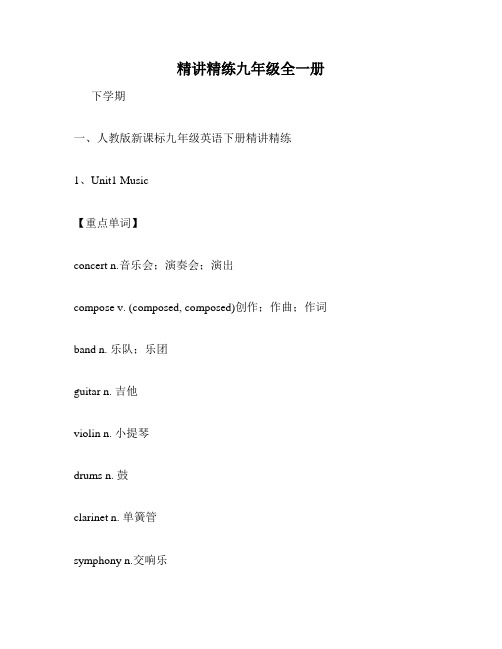
精讲精练九年级全一册下学期一、人教版新课标九年级英语下册精讲精练1、Unit1 Music【重点单词】concert n.音乐会;演奏会;演出compose v. (composed, composed)创作;作曲;作词band n. 乐队;乐团guitar n. 吉他violin n. 小提琴drums n. 鼓clarinet n. 单簧管symphony n.交响乐classic adj. 典型的;经典的n. 典范audience n.观众;听众【重点短语】look forward to 期待;期盼sing along 随着唱listen to 听…at the end of 在…末尾in total =altogether 总的来说;总共practice…for 为…而练习take up 占据;开始从事【重要句子】1. What kind of music do you like? 你喜欢什么样的音乐?2. He composed four symphonies in total. 他总共作曲了四部交响乐曲。
3. I often listen to it while I'm walking. 我经常在散步时听这种音乐。
4. What do you think of classical music? 你认为古典音乐怎么样?5. He began to take up violin at the age of six. 他从6岁开始练习小提琴。
二、Unit2 Movies【重点单词】actor n. 演员actress n. 女演员director n. 导演screen n. 屏幕;银幕picture n. 图片;影片performance n. 演出;表演talent n. 才能plot n. 情节;故事情节drama n. 戏剧comedy n. 喜剧documentary n. 记录片cartoon n. 卡通【重点短语】a variety of 各种各样的;多种多样的pay attention to 注意;留心make a living 谋生【重点句子】1. Some actors have natural talenl, while others have to work very hard. 有些演员有天赋,而其他的则需要艰苦努力。
九年级英语每课时精讲精练系列专题13.2 Period 2 Section A 3a-4c(人教版)
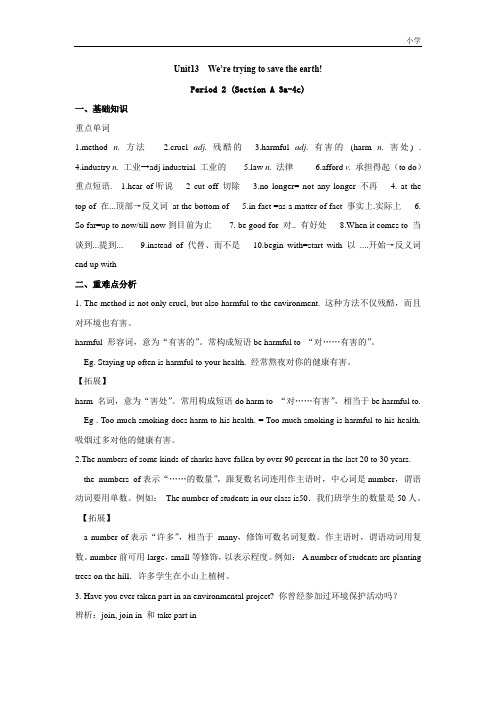
Unit13 We’re trying to save the earth!Period 2 (Section A 3a-4c)一、基础知识重点单词1.method n.方法2.cruel adj.残酷的3.harmful adj.有害的(harm n.害处) .4.industry n.工业→adj industrial 工业的w n.法律6.afford v.承担得起(to do)重点短语. 1.hear of听说 2 cut off 切除 3.no longer= not any longer 不再 4. at the top of 在...顶部→反义词at the bottom of 5.in fact =as a matter of fact 事实上.实际上 6. So far=up to now/till now到目前为止7. be good for 对.. 有好处8.When it comes to 当谈到...提到...9.instead of 代替、而不是10.begin with=start with 以....开始→反义词end up with二、重难点分析1. The method is not only cruel, but also harmful to the environment. 这种方法不仅残酷,而且对环境也有害。
harmful 形容词,意为“有害的”。
常构成短语be harmful to “对……有害的”。
Eg. Staying up often is harmful to your health. 经常熬夜对你的健康有害。
【拓展】harm 名词,意为“害处”。
常用构成短语do harm to “对……有害”,相当于be harmful to. Eg . Too much smoking does harm to his health. = Too much smoking is harmful to his health. 吸烟过多对他的健康有害。
九年级英语每课时精讲精练系列专题5-2Period2SectionA3a-4c(人教版)
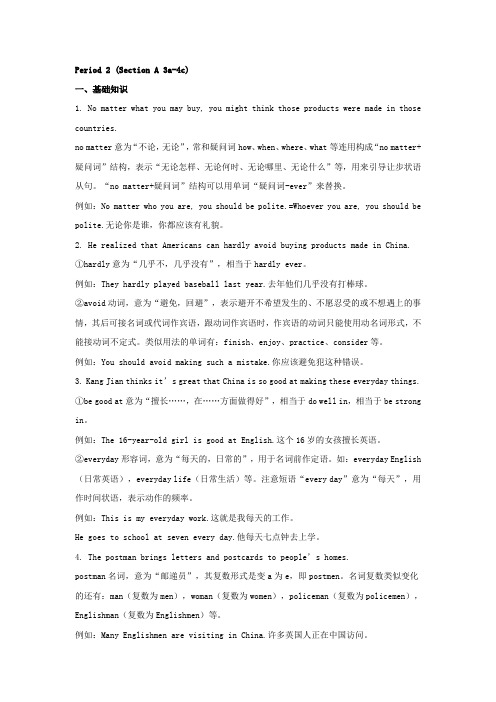
Period 2 (Section A 3a-4c)一、基础知识1. No matter what you may buy, you might think those products were made in those countries.no matter意为“不论,无论”,常和疑问词how、when、where、what等连用构成“no matter+疑问词”结构,表示“无论怎样、无论何时、无论哪里、无论什么”等,用来引导让步状语从句。
“no matter+疑问词”结构可以用单词“疑问词-ever”来替换。
例如:No matter who you are, you should be polite.=Whoever you are, you should be polite.无论你是谁,你都应该有礼貌。
2. He realized that Americans can hardly avoid buying products made in China.①hardly意为“几乎不,几乎没有”,相当于hardly ever。
例如:They hardly played baseball last year.去年他们几乎没有打棒球。
②avoid动词,意为“避免,回避”,表示避开不希望发生的、不愿忍受的或不想遇上的事情,其后可接名词或代词作宾语,跟动词作宾语时,作宾语的动词只能使用动名词形式,不能接动词不定式。
类似用法的单词有:finish、enjoy、practice、consider等。
例如:You should avoid making such a mistake.你应该避免犯这种错误。
3. Kang Jian thinks it’s great that China is so good at making these everyday things.①be good at意为“擅长……,在……方面做得好”,相当于do well in,相当于be strong in。
九年级英语每课时精讲精练系列专题2-2Period2SectionA3a-4c(人教版)
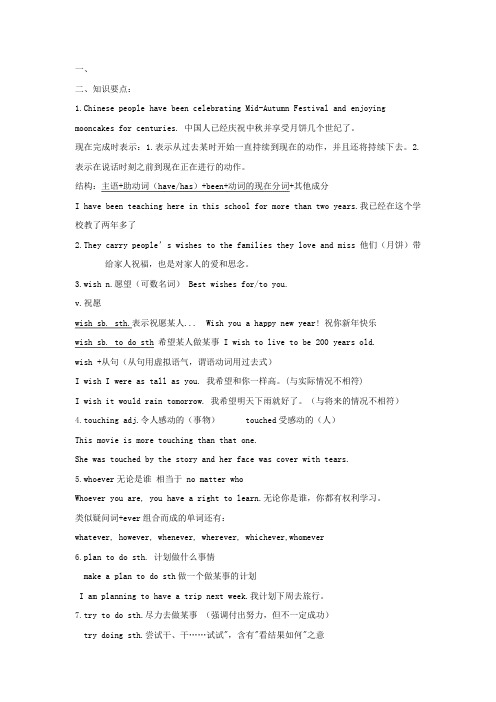
一、二、知识要点:1.Chinese people have been celebrating Mid-Autumn Festival and enjoying mooncakes for centuries. 中国人已经庆祝中秋并享受月饼几个世纪了。
现在完成时表示:1.表示从过去某时开始一直持续到现在的动作,并且还将持续下去。
2.表示在说话时刻之前到现在正在进行的动作。
I have been teaching here in this school for more than two years.我已经在这个学校教了两年多了2.They carry people’s wishes to the families they love and miss他们(月饼)带给家人祝福,也是对家人的爱和思念。
3.wish n.愿望(可数名词) Best wishes for/to you.v.祝愿wish +从句(从句用虚拟语气,谓语动词用过去式)I wish I were as tall as you. 我希望和你一样高。
(与实际情况不相符)I wish it would rain tomorrow. 我希望明天下雨就好了。
(与将来的情况不相符)4.touching adj.令人感动的(事物) touched受感动的(人)This movie is more touching than that one.She was touched by the story and her face was cover with tears.5.whoever无论是谁相当于 no matter whoWhoever you are, you have a right to learn.无论你是谁,你都有权利学习。
类似疑问词+ever组合而成的单词还有:whatever, however, whenever, wherever, whichever,whomever6.plan to do sth. 计划做什么事情make a plan to do sth做一个做某事的计划I am planning to have a trip next week.我计划下周去旅行。
九年级英语每课时精讲精练系列专题13-2Period2SectionA3a-4c(人教版)
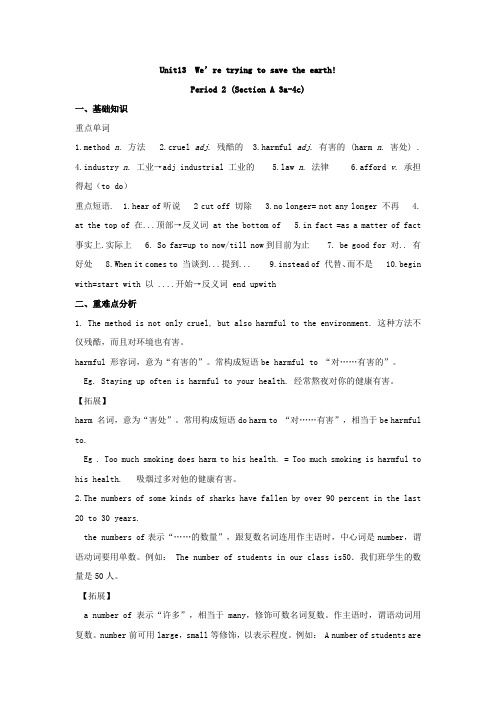
Unit13 We’re trying to save the earth!Period 2 (Section A 3a-4c)一、基础知识重点单词1.method n.方法2.cruel adj.残酷的3.harmful adj.有害的 (harm n.害处) .4.industry n.工业→adj industrial 工业的w n.法律6.afford v.承担得起(to do)重点短语. 1.hear of听说 2 cut off 切除 3.no longer= not any longer 不再 4. at the top of 在...顶部→反义词 at the bottom of 5.in fact =as a matter of fact 事实上.实际上 6. So far=up to now/till now到目前为止 7. be good for 对.. 有好处 8.When it comes to 当谈到...提到... 9.instead of 代替、而不是 10.begin with=start with 以 ....开始→反义词 end upwith二、重难点分析1. The method is not only cruel, but also harmful to the environment. 这种方法不仅残酷,而且对环境也有害。
harmful 形容词,意为“有害的”。
常构成短语be harmful to “对……有害的”。
Eg. Staying up often is harmful to your health. 经常熬夜对你的健康有害。
【拓展】harm 名词,意为“害处”。
常用构成短语do harm to “对……有害”,相当于be harmful to.Eg . Too much smoking does harm to his health. = Too much smoking is harmful to his health. 吸烟过多对他的健康有害。
九年级英语每课时精讲精练系列专题7-1Period1SectionA1a-2d(人教版)

Unit 7 Teenagers should be allowed to choose their own clothes第一课时一、基础知识Ⅰ基本语言功能1.表达应该被允许去做某事sb. should be allowed to do sth.2.表达不应该被允许去做某事sb. should not be allowed to do sth. / sb. must not be allowed to do sth. Ⅱ基础词汇与短语1.allow 允许allow doing sth. 允许做某事They don’t allow smoking他们不允许吸烟.allow sb. to do sth.允许某人去做某事They don’t allow us to smoke他们不允许吸烟.sb. be allowed to do sth. 某人被允许某人去做某事We are allowed to smoke (by them).我们被(他们)允许吸烟.2.smokeThe house was smoking.房子正在冒烟.(不及物动词)You must not smoke in the classroom你决不能在教室里吸烟. (不及物动词)He was sitting alone, smoking a big cigar.他那时正独自坐着,抽着一根大雪茄. (及物动词)3.pierceAn arrow pierced my left ear.一支箭刺穿了我的左耳朵.have sth. pierced使得某物被穿孔have/get one’s ears pierced使得某人的耳朵被穿孔.(让别人给自己扎耳孔)I'm having my ears pierced on Saturday.我星期六要去扎耳洞。
4.safetyYou needn’t worry about our safety.We are quite safe ,relaxed and happy.你不必担心我们的安全.我们非常的安全,放松和愉快.(safety是safe的名词形式,是抽象名词.)5.have a part-time job拥有一份兼职工作.反义词组是have a full-time job,拥有一份全职工作.6.choose one’s own things挑选某人自己(最喜欢)的东西7. sixteen-year-olds 所有16岁的青少年们= sixteen years old children8. cut one’s hair=have one’s hair cut 理发My dad is going to cut my hair.He thinks my hair style is very silly.But I want to go to the barber’s to have my hair cut.我爸爸想给我剪头发.他认为我的发型太二了.但是我想去理发店,请理发师给我理发. 9.be / feel excited about doing sth.因做某事而感到兴奋10.take a photo using a bright light用闪光灯拍照11.I’ll bring my camerea anyway.无论如何我也要把相机带来.二、重难点分析Ⅰ本节课用allow(允许)这个单词来引入新的语法点,带情态动词的被动语态.1. allow sb.to do sth.是主动语态形式,意思是允许某人去做某事.2. sb. be allowed to do sth.就是被动语态形式,意思是被允许去做某事.动词的被动语态构成规则是: 情态动词 + be + 动词的过去分词.Ⅱ本节课应用should (not) be allowed to do sth.这个短语.来讨论作为青少年应该和不应该被允许做的事情.在学习本节课的过程中,要牢牢的把握住allow这个单词被动语态形式的构成规则.以便于为下节课操练其他动词的被动语态打下基础.典型例题分析1.____ are those who were born in 2000.。
九年级英语每课时精讲精练系列专题1-2Period2SectionA3a-4c(人教版)
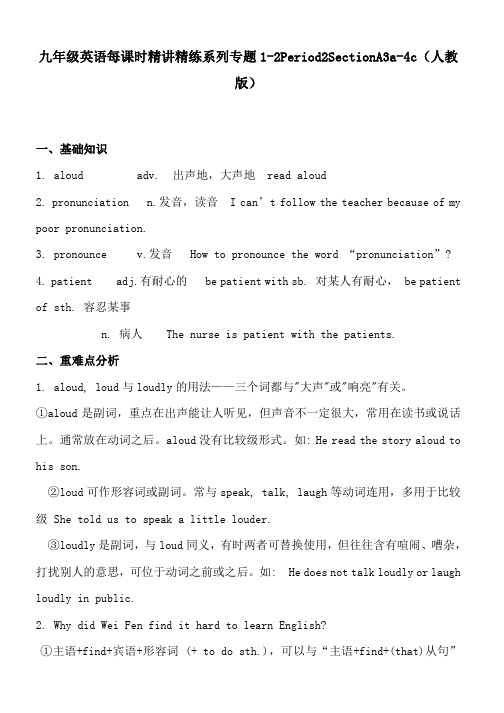
九年级英语每课时精讲精练系列专题1-2Period2SectionA3a-4c(人教版)一、基础知识1. aloud adv. 出声地,大声地 read aloud2. pronunciation n.发音,读音 I can’t follow the teacher because of my poor pronunciation.3. pronounce v.发音 How to pronounce the word “pronunciation”?4. patient adj.有耐心的 be patient with sb. 对某人有耐心, be patient of sth. 容忍某事n. 病人 The nurse is patient with the patients.二、重难点分析1. aloud, loud与loudly的用法——三个词都与"大声"或"响亮"有关。
①aloud是副词,重点在出声能让人听见,但声音不一定很大,常用在读书或说话上。
通常放在动词之后。
aloud没有比较级形式。
如: He read the story aloud to his son.②loud可作形容词或副词。
常与speak, talk, laugh等动词连用,多用于比较级 She told us to speak a little louder.③loudly是副词,与loud同义,有时两者可替换使用,但往往含有喧闹、嘈杂,打扰别人的意思,可位于动词之前或之后。
如: He does not talk loudly or laugh loudly in public.2. Why did Wei Fen find it hard to learn English?①主语+find+宾语+形容词 (+ to do sth.),可以与“主语+find+(that)从句”替换。
九年级英语每课时精讲精练系列专题9-2Period2SectionA3a-4c(人教版)
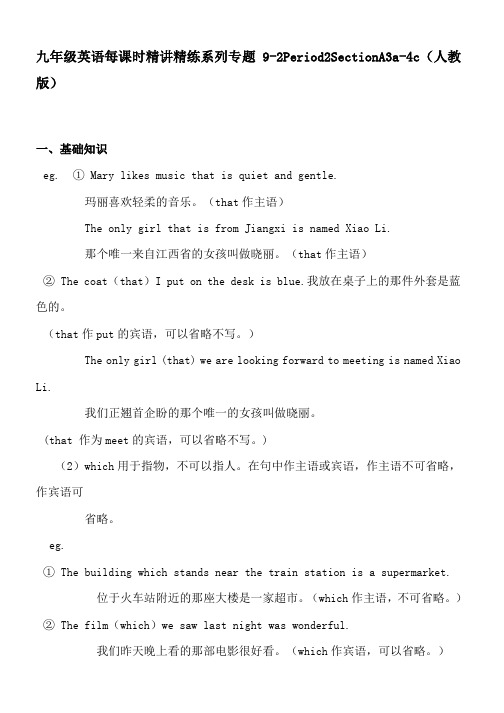
九年级英语每课时精讲精练系列专题9-2Period2SectionA3a-4c(人教版)一、基础知识eg. ① Mary likes music that is quiet and gentle.玛丽喜欢轻柔的音乐。
(that作主语)The only girl that is from Jiangxi is named Xiao Li.那个唯一来自江西省的女孩叫做晓丽。
(that作主语)② The coat(that)I put on the desk is blue.我放在桌子上的那件外套是蓝色的。
(that作put的宾语,可以省略不写。
)The only girl (that) we are looking forward to meeting is named Xiao Li.我们正翘首企盼的那个唯一的女孩叫做晓丽。
(that 作为meet的宾语,可以省略不写。
)(2)which用于指物,不可以指人。
在句中作主语或宾语,作主语不可省略,作宾语可省略。
eg.① The building which stands near the train station is a supermarket.位于火车站附近的那座大楼是一家超市。
(which作主语,不可省略。
)② The film(which)we saw last night was wonderful.我们昨天晚上看的那部电影很好看。
(which作宾语,可以省略。
)Ⅱ基础词汇与短语1.plenty of 大量的。
后面跟可数和不可数名词都可以。
Plenty of = a lot of = lots of = many + much2.documentary 纪录片。
thriller 恐怖片action movie 动作片comedy 喜剧片soap opera 肥皂剧cartoon 动画片3.drama n.戏剧,剧本eg.Radio drama has its limitations.广播剧有其局限性。
九年级英语每课时精讲精练系列专题4-2Period2SectionA3a-4c(人教版)(1)
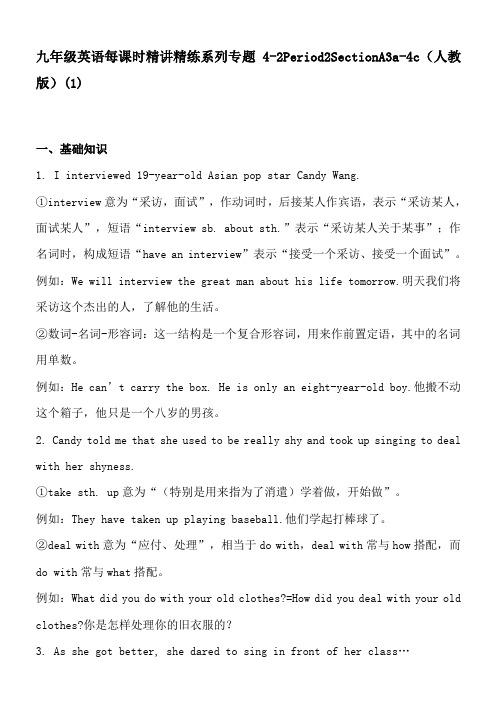
九年级英语每课时精讲精练系列专题4-2Period2SectionA3a-4c(人教版)(1)一、基础知识1. I interviewed 19-year-old Asian pop star Candy Wang.①interview意为“采访,面试”,作动词时,后接某人作宾语,表示“采访某人,面试某人”,短语“interview sb. about sth.”表示“采访某人关于某事”;作名词时,构成短语“have an interview”表示“接受一个采访、接受一个面试”。
例如:We will interview the great man about his life tomorrow.明天我们将采访这个杰出的人,了解他的生活。
②数词-名词-形容词:这一结构是一个复合形容词,用来作前置定语,其中的名词用单数。
例如:He can’t carry the box. He is only an eight-year-old boy.他搬不动这个箱子,他只是一个八岁的男孩。
2. Candy told me that she used to be really shy and took up singing to dealwith her shyness.①take sth. up意为“(特别是用来指为了消遣)学着做,开始做”。
例如:They have taken up playing baseball.他们学起打棒球了。
②deal with意为“应付、处理”,相当于do with,deal with常与how搭配,而do with常与what搭配。
例如:What did you do with your old clothes?=How did you deal with your oldclothes?你是怎样处理你的旧衣服的?3. As she got better, she dared to sing in front of her class…①dare作行为动词,意为“胆敢,敢于”,有人称、时态和数的变化。
九年级英语每课时精讲精练系列专题14-1Period1SectionA1a-2d(人教版)
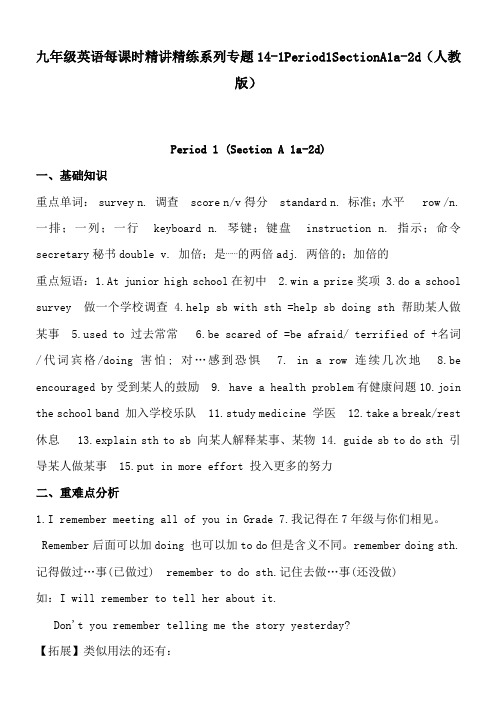
九年级英语每课时精讲精练系列专题14-1Period1SectionA1a-2d(人教版)Period 1 (Section A 1a-2d)一、基础知识重点单词: survey n. 调查 score n/v得分 standard n. 标准;水平 row /n. 一排;一列;一行 keyboard n. 琴键;键盘 instruction n. 指示;命令secretary秘书double v. 加倍;是⋯⋯的两倍adj. 两倍的;加倍的重点短语:1.At junior high school在初中 2.win a prize奖项 3.do a school survey 做一个学校调查 4.help sb with sth =help sb doing sth 帮助某人做某事 ed to 过去常常 6.be scared of =be afraid/ terrified of +名词/代词宾格/doing害怕; 对…感到恐惧7. in a row 连续几次地8.be encouraged by受到某人的鼓励 9. have a health problem有健康问题10.join the school band 加入学校乐队 11.study medicine 学医 12.take a break/rest 休息 13.explain sth to sb 向某人解释某事、某物 14. guide sb to do sth 引导某人做某事 15.put in more effort 投入更多的努力二、重难点分析1.I remember meeting all of you in Grade 7.我记得在7年级与你们相见。
Remember后面可以加doing 也可以加to do但是含义不同。
remember doing sth. 记得做过…事(已做过) remember to do sth.记住去做…事(还没做)如:I will remember to tell her about it.Don't you remember telling me the story yesterday?【拓展】类似用法的还有:forget doing sth. 忘记做过…事(已做) forget to do sth.忘记该做…事(还未做)如:①I forget writing that letter. ②I forget to bring the dictionary with me.stop doing sth. 停止做…事(同一件事) stop to do sth. 停下来做…事(另外一件事)go on doing 继续做...事(同一件事) go on to do 继续做...事(另外一件事)try doing sth. 试着去做… try to do sth. 努力做…mean to do 打算做某事 mean doing 意味着做...事2.Add more to the list. 向列表中添加更多。
九年级英语每课时精讲精练系列专题5-3Period3SectionB1a-2e(人教版)
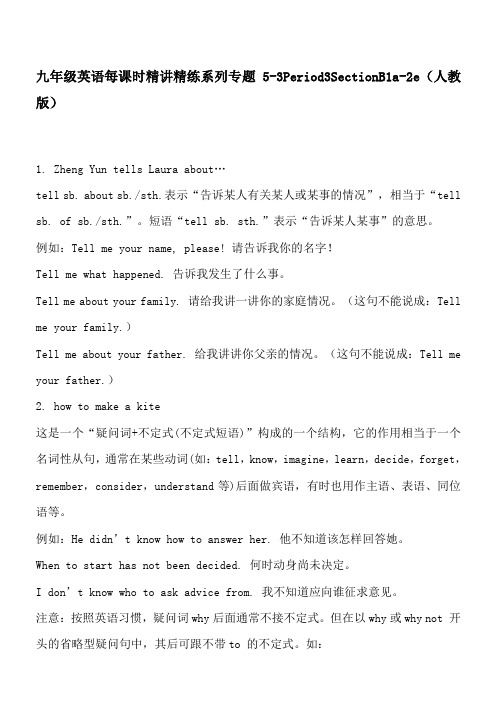
九年级英语每课时精讲精练系列专题5-3Period3SectionB1a-2e(人教版)1. Zheng Yun tells Laura about…tell sb. about sb./sth.表示“告诉某人有关某人或某事的情况”,相当于“tell sb. of sb./sth.”。
短语“tell sb. sth.”表示“告诉某人某事”的意思。
例如:Tell me your name, please! 请告诉我你的名字!Tell me what happened. 告诉我发生了什么事。
Tell me about your family. 请给我讲一讲你的家庭情况。
(这句不能说成:Tellme your family.)Tell me about your father. 给我讲讲你父亲的情况。
(这句不能说成:Tell meyour father.)2. how to make a kite这是一个“疑问词+不定式(不定式短语)”构成的一个结构,它的作用相当于一个名词性从句,通常在某些动词(如:tell,know,imagine,learn,decide,forget,remember,consider,understand等)后面做宾语,有时也用作主语、表语、同位语等。
例如:He didn’t know how to answer her. 他不知道该怎样回答她。
When to start has not been decided. 何时动身尚未决定。
I don’t know who to ask advice from. 我不知道应向谁征求意见。
注意:按照英语习惯,疑问词why后面通常不接不定式。
但在以why或why not 开头的省略型疑问句中,其后可跟不带to 的不定式。
如:You’re looking tired. Why not take a holiday? 你一脸倦容,怎么不休假呢?3. …wants to learn to fly a kite.want动词,意为“想要”。
九年级英语每课时精讲精练系列专题13-1Period1SectionA1a-2d(人教版)

九年级英语每课时精讲精练系列专题13-1Period1SectionA1a-2d(人教版)1.We’re trying to save the earth. 我们在努力拯救地球。
Try to do sth.表示尽自己最大能力做某事,等同于try one's best to do sth. 这里强调的是要设法、想法的意思. Eg.He tried to finish the work ahead of time.他设法提前完成这件工作。
注意:try doing sth.表示尝试着做某事,why didn't you try riding a bike to go to school? 为什么不试着骑车去学校呢?2. The river was dirty. Even the bott om of the river was full of rubbish.be full of...=be filled with... 充满......装满......Eg,The bottle is full of water.=The bottle is filled with water.3.The rive used to be so clean这河流过去是如此的清澈。
used to do sth. 过去常常做某事,(意思现在不做了) 例:I used to get up early and take an hour's walk before breakfast. 我过去常常起床很早并且在早餐前散步一小时。
注意区分:be used to doing sth / be used to sth . 是指习惯于做某事.(这里的to 是介词.) 例: She isn’t used to living in the countryside now. 她不习惯在乡下生活。
Are you used to the food here? 你习惯吃这儿的饭菜吗?4. Everyone in this town should play a part in cleaning it upplay a part in=play a role in 指在。
九年级英语每课时精讲精练系列专题1-3Period3SectionB1a-2e(人教版)
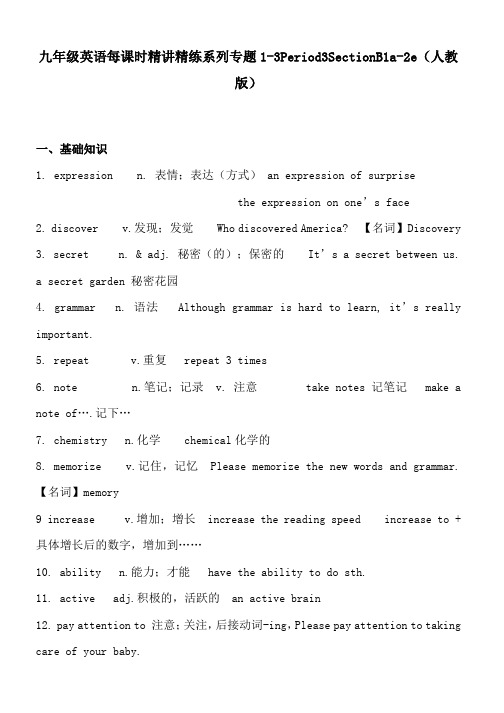
九年级英语每课时精讲精练系列专题1-3Period3SectionB1a-2e(人教版)一、基础知识1. expression n. 表情;表达(方式) an expression of surprisethe expression on one’s face2. discover v.发现;发觉 Who discovered America? 【名词】Discovery3. secret n. & adj. 秘密(的);保密的 It’s a secret between us.a secret garden 秘密花园4. grammar n. 语法 Although grammar is hard to learn, it’s really important.5. repeat v.重复 repeat 3 times6. note n.笔记;记录 v. 注意 take notes记笔记 make anote of….记下…7. chemistry n.化学 chemical化学的8. memorize v.记住,记忆 Please memorize the new words and grammar.【名词】memory9 increase v.增加;增长 increase the reading speed increase to +具体增长后的数字,增加到……10. ability n.能力;才能 have the ability to do sth.11. active adj.积极的,活跃的 an active brain12. pay attention to 注意;关注,后接动词-ing,Please pay attention to takingcare of your baby.13. connect …with…把…和…联系起来 The bridge connect the city with the country.14. review v.回顾,复习 Reviewing old knowledge helps you get a better understanding of the new.15. knowledge n.知识,学问;不可数名词16. wisely adv.聪明地,明智地 learn wisely;形容词wise,名词wisdom 智慧。
九年级英语每课时精讲精练系列专题9-1Period1SectionA1a-2d(人教版)
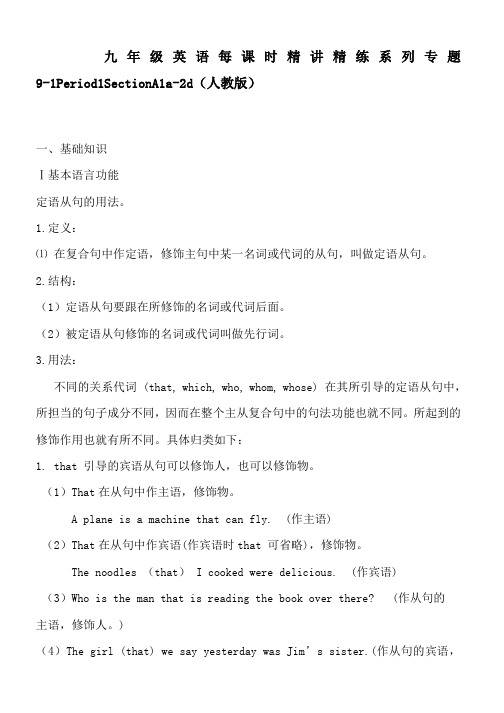
九年级英语每课时精讲精练系列专题9-1Period1SectionA1a-2d(人教版)一、基础知识Ⅰ基本语言功能定语从句的用法。
1.定义:⑴在复合句中作定语,修饰主句中某一名词或代词的从句,叫做定语从句。
2.结构:(1)定语从句要跟在所修饰的名词或代词后面。
(2)被定语从句修饰的名词或代词叫做先行词。
3.用法:不同的关系代词 (that, which, who, whom, whose) 在其所引导的定语从句中,所担当的句子成分不同,因而在整个主从复合句中的句法功能也就不同。
所起到的修饰作用也就有所不同。
具体归类如下:1. that 引导的宾语从句可以修饰人,也可以修饰物。
(1)That在从句中作主语,修饰物。
A plane is a machine that can fly. (作主语)(2)That在从句中作宾语(作宾语时that 可省略),修饰物。
The noodles (that) I cooked were delicious. (作宾语)(3)Who is the man that is reading the book over there? (作从句的主语,修饰人。
)(4)The girl (that) we say yesterday was Jim’s sister.(作从句的宾语,修饰人。
)2. Which在从句中作主语或宾语(作宾语时可省略),只能是修饰物。
(1)The silk which is produced in Hangzhou sells well. (作主语)(2)The songs (which) Liu Dehua sang were very popular. (作宾语)5. Who / that 在定语从句中做主语时,需要注意的是谓语动词的单复数应与先行词保持一致。
例如:I like a sandwich that is really delicious.I love singers who are beautiful.I have a friend who plays sports.I prefer shoes that are cool.Ⅱ基础词汇与短语1. Suppose vt. 想,认为,猜想,料想。
九年级英语每课时精讲精练系列专题4-3Period3SectionB1a-2e(人教版)(1)
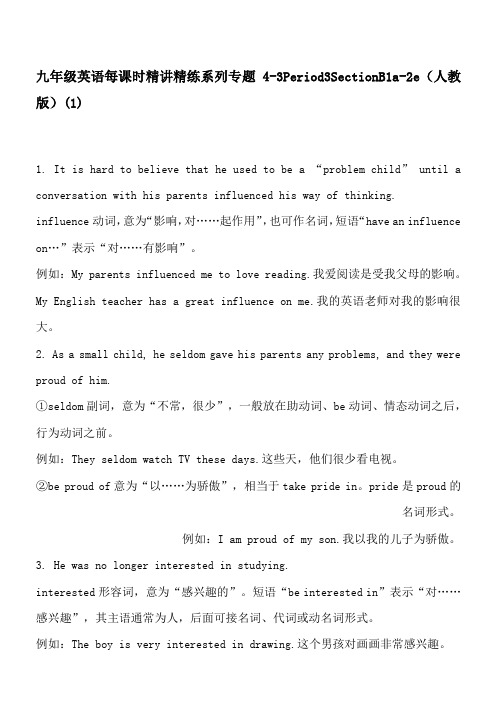
九年级英语每课时精讲精练系列专题4-3Period3SectionB1a-2e(人教版)(1)1. It is hard to believe that he used to be a “problem child” until aconversation with his parents influenced his way of thinking. influence动词,意为“影响,对……起作用”,也可作名词,短语“have an influenceon…”表示“对……有影响”。
例如:My parents influenced me to love reading.我爱阅读是受我父母的影响。
My English teacher has a great influence on me.我的英语老师对我的影响很大。
2. As a small child, he seldom gave his parents any problems, and they wereproud of him.①seldom副词,意为“不常,很少”,一般放在助动词、be动词、情态动词之后,行为动词之前。
例如:They seldom watch TV these days.这些天,他们很少看电视。
②be proud of意为“以……为骄傲”,相当于take pride in。
pride是proud的名词形式。
例如:I am proud of my son.我以我的儿子为骄傲。
3. He was no longer interested in studying.interested形容词,意为“感兴趣的”。
短语“be interested in”表示“对……感兴趣”,其主语通常为人,后面可接名词、代词或动名词形式。
例如:The boy is very interested in drawing.这个男孩对画画非常感兴趣。
unit5 sectionA知识点精讲精练-英语九年级全一册教材知识点精讲精练(人教新目标版)

Unit 5 section A一、知识点讲解1、be made 和介词搭配【辨析】be made from, be made of, be made in与be made by?— Wheat. It can also be made many kinds of food.A . from; into B. of;from C.from;of【答案】A【解析】句意:——这种酒是用什么做的?——小麦。
它也可以被制成许多种食物。
考查介词辨析、固定搭配。
be made from 由..制成,看不出原材料;be made of 由..制成,指能看得出来是什么原材料做的;be made into被制成....,是一个被动句的动词结构,从文字的表层意思推断空格1指“酒是用什么做的”,酿酒的原材料看不见,所以用“be made from”,空格2指“被制成许多种食物”,所以用被动语态的结构“be made into”;故选A。
2、no matter无论,不论与what, who, when, where, how等疑问词连用,引导让步状语从句。
在从句中,常用一般现在时表示将来,状语从句可放在主句前或主句后。
例句:No matter what you say, I won’t believe you. 无论你说什么,我都不会相信你。
例句:No matter who you are, you must obey the rules. 无论你是谁,都必须遵守规则。
【拓展】"no matter + 疑问词"结构相当于"疑问词+ ever"。
no matter how = however (无论怎样)no matter what=whatever (无论什么)no matter when=whenever (无论何时)no matter where=wherever (无论哪里)【例题】No matter you want, your parents are willing to get it for you.A .who B.what C.with D.by【答案】B【解析】句意:无论你想要什么,你的父母都愿意为你买。
九年级英语每课时精讲精练系列专题1-1Period1SectionA1a-2d(人教版)

Unit 1 How can we become good learners?第一课时Period 1 (Section A 1a-2d)一、基础知识1. What about listening to tapes?听磁带如何?What about …?……怎么样?这是一个固定句型,相当于“How about…?”。
该句型通常用于征求意见、提建议或询问消息,其后接名词、代词或动名词。
如:What/How about going fishing this afternoon?今天下午去钓鱼怎么样?2. It’s too hard to understand the voices.太难了以至于无法听懂发音。
too…to…的意思是太…以至于不能…,此短语表否定意义,与 not + adj enough to do 同义。
3. That doesn’t sound too bad. 这听起来也不坏呀。
这里sound是一个系动词,后需要接形容词。
二、重难点分析1. I study by making word cards.我通过制作词汇卡学习。
介词by在此处可译为“通过”,指通过某种方式,由于是介词,所以其后接动词时,动词用ing形式。
如:He finished his homework by asking his elder sister for help.他通过向他姐姐寻求帮助完成了家庭作业。
by后还可接表示交通工具的名词,表示乘坐某种交通工具。
如:He always goes to school by bike.他总是骑自行车上学。
1. “by+ 动词-ing”,表示做事的方式、途径和方法等,对by引导的介词短语提问,用how。
如:—How do you learn English? —(I study English) By making word cards.2.It takes time.它需要时间。
- 1、下载文档前请自行甄别文档内容的完整性,平台不提供额外的编辑、内容补充、找答案等附加服务。
- 2、"仅部分预览"的文档,不可在线预览部分如存在完整性等问题,可反馈申请退款(可完整预览的文档不适用该条件!)。
- 3、如文档侵犯您的权益,请联系客服反馈,我们会尽快为您处理(人工客服工作时间:9:00-18:30)。
Period 2 (Section A 3a-4c)
一、基础知识
1. No matter what you may buy, you might think those products were made in those countries.
no matter意为“不论,无论”,常和疑问词how、when、where、what等连用构成“no matter+疑问词”结构,表示“无论怎样、无论何时、无论哪里、无论什么”等,用来引导让步状语从句。
“no matter+疑问词”结构可以用单词“疑问词-ever”来替换。
例如:No matter who you are, you should be polite.=Whoever you are, you should be polite.无论你是谁,你都应该有礼貌。
2. He realized that Americans can hardly avoid buying products made in China.
①hardly意为“几乎不,几乎没有”,相当于hardly ever。
例如:They hardly played baseball last year.去年他们几乎没有打棒球。
②avoid动词,意为“避免,回避”,表示避开不希望发生的、不愿忍受的或不想遇上的事情,其后可接名词或代词作宾语,跟动词作宾语时,作宾语的动词只能使用动名词形式,不能接动词不定式。
类似用法的单词有:finish、enjoy、practice、consider等。
例如:You should avoid making such a mistake.你应该避免犯这种错误。
3. Kang Jian thinks it’s great that China is so good at making these everyday things.
①be good at意为“擅长……,在……方面做得好”,相当于do well in,相当于be strong in。
例如:The 16-year-old girl is good at English.这个16岁的女孩擅长英语。
②everyday形容词,意为“每天的,日常的”,用于名词前作定语。
如:everyday English(日常英语),everyday life(日常生活)等。
注意短语“every day”意为“每天”,用作时间状语,表示动作的频率。
例如:This is my everyday work.这就是我每天的工作。
He goes to school at seven every day.他每天七点钟去上学。
4. The postman brings letters and postcards to people’s homes.
postman名词,意为“邮递员”,其复数形式是变a为e,即postmen。
名词复数类似变化的还有:man(复数为men),woman(复数为women),policeman(复数为policemen),Englishman (复数为Englishmen)等。
例如:Many Englishmen are visiting in China.许多英国人正在中国访问。
二、重难点分析
1. He found it interesting that so many products in the local shops were made in China.
句型“主语+find/think/believe/feel+it+形容词+to do sth.(或+that引导的从句)”中,it为形式宾语,后面的动词不定式或that引导的从句是真正的宾语,句中的形容词为宾语补足语,补充说明宾语的情况。
例如:I find it important to learn English well.我发现学好英语很重要。
2. Kang Jian thinks it’s great that China is so good at making these everyday things.
这个句子较为复杂,首先这是一个含有宾语从句的复合句,主句的主语是Kang Jian,谓语是thinks,thinks后面部分为宾语,是一个宾语从句;其二,宾语从句本身又是一个含有主语从句的复合句,这个复合句的结构是“It’s+形容词+that从句”,句中的it是形式主语,真正的主语是后面的that从句。
例如:It’s very important that we have a good way of studying English.我们有好的英语学习方法很重要。
典型例题分析
三、感悟中考
1. (2014年山东省威海市中考)—Tom! I looked for you everywhere at the party last night. —Oh, I ______ to the party.
A. am invited
B. was invited
C. am not invited
D. wasn’t invited
四、专项训练
(一)基础练习
单项选择:
( )1. They went to the concert, did they?
A. often
B. hardly
C. always
【解析】这是一个反意疑问句,从后面的附加问句使用肯定形式可知,前面应该用否定。
【答案】B
( )2. He is good math. He often gets a high score on his math test.
A. at
B. for
C. to
( )3. There are some over there.
A. postmen
B. Germen
C. Englishmans
( )4. is interesting to listen to the old man telling jokes.
A. This
B. That
C. It
( )5. They sent the old man to the hospital in time. He .
A. saved
B. was saved
C. is saved
(二)提升练习
单项选择:
( )1. The boy have finished the 2000-word composition.
A. to write
B. writing
C. wrote
【解析】finish和本单元所学的avoid一样,后面跟动词作宾语时,作宾语的动词只能用动
名词形式。
【答案】B
( )2. where you are, you must remember you are Chinese.
A. If
B. Even though
C. No matter
( )3. —______do you go to the library? —Hardly ever.
A. How much
B. How often
C. How soon
【解析】从下文的回答可知,提问的是频率。
【答案】B
( )4. Tom’s room . It looks very clean.
A. is cleaned
B. has cleaned
C. has been cleaned
( )5. —What’s this? —Oh, my God! It’s a gift for James. I forgot _____ it this afternoon.
A. to post
B. posting
C. post。
